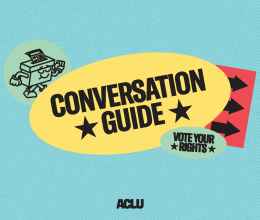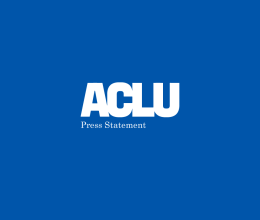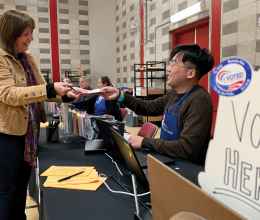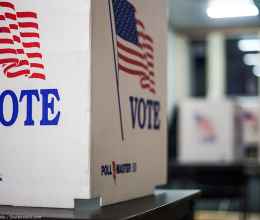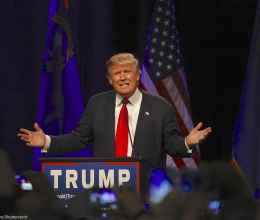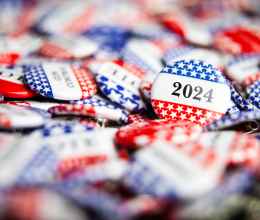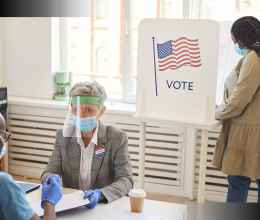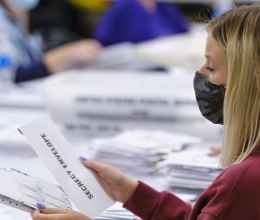
This August marks 60 years since President Lyndon B. Johnson signed the Voting Rights Act (VRA) into law. The act is the crown jewel of civil rights legislation and seeks to finally make the Constitution's promise of equality real. In the past year alone, the ACLU was in federal court wielding this very law to ensure that Black voters have an equal opportunity to participate in the political process in Alabama, Georgia, Louisiana and Mississippi. These two realities capture where we are: celebrating the VRA's legacy, while fighting desperately to save it from destruction.
At the ACLU's Voting Rights Project, we’ve relied on the VRA to combat discrimination, litigating at least 16 cases under the act in the past decade alone. But increasingly, we’re fighting to save the act itself.
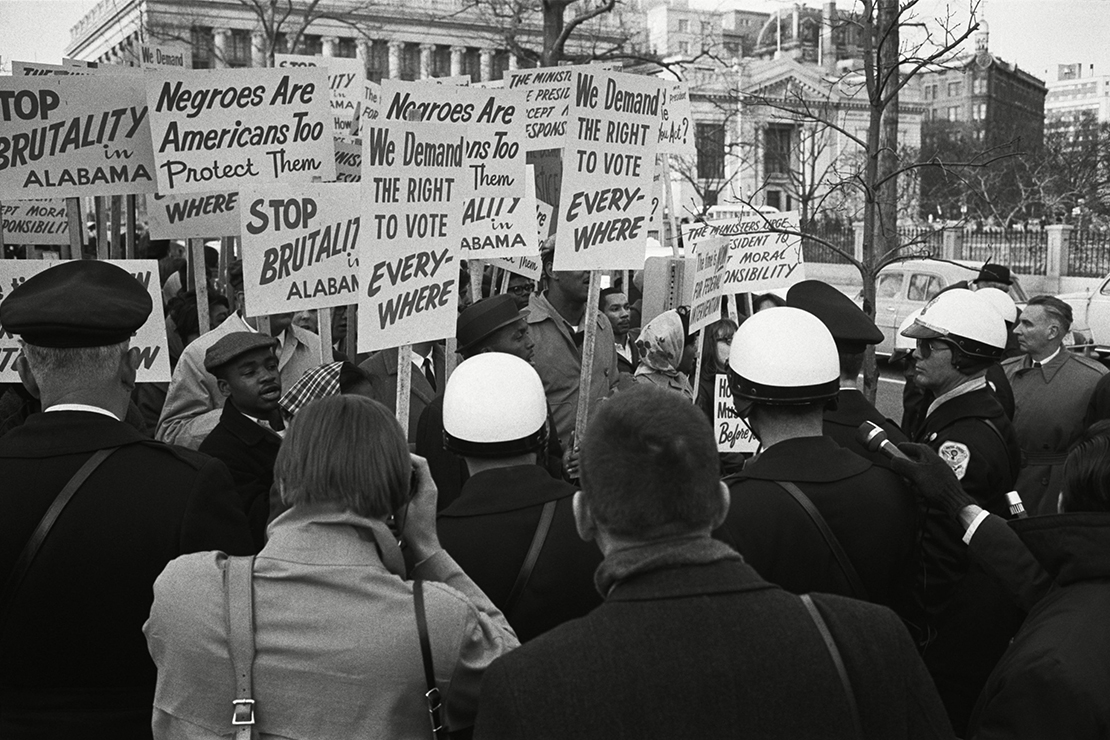
On March 12, 1965, Black demonstrators gathered outside the White House to protest in solidarity with demonstrators in Selma.
Everett/Shutterstock
I've seen what happens when this pillar stands strong. I've watched judges strike down discriminatory laws, jurisdictions open polling places under threat of litigation, and citizens previously denied access cast their ballots. Yet these victories only tell half the story. I've also seen what happens when we can't use it—voters turned away, communities silenced, democracy denied. Since a deeply consequential 2013 Supreme Court decision, state legislatures have mounted a coordinated attack on voting access and introduced hundreds of voter suppression bills. Each case represents thousands of voters—real people whose fundamental rights hang in the balance.
What makes these attacks especially dangerous is that they're happening just as the Voting Rights Act—a law constructed specifically to stop such attacks—is threatened with systematic destruction. We're witnessing deliberate structural damage to a crucial pillar supporting American democracy.
Even under siege, this pillar still stands—and still works. The recent victories show what's possible when the VRA operates as intended, and what we risk losing if it falls.
In Allen v. Milligan, we successfully challenged Alabama's congressional map, proving the map violated Section 2 of the VRA by diluting Black voting power. The result: Alabama elected two Black representatives to Congress for the first time in history. Similar victories in Georgia, Louisiana, and Mississippi forced new majority-Black districts after courts found unlawful vote dilution.
These victories demonstrate the VRA's power to restore what discrimination steals. But here's what should terrify every American: The foundation supporting these wins is cracking, and the attacks are accelerating.
The recent onslaught on this democratic pillar began with calculated design. In the 2013 case, Shelby v. Holder, the Supreme Court knocked out a crucial beam—what’s known as preclearance, a provision that requires certain jurisdictions with a record of racial discrimination in voting to obtain federal approval before making any changes to their voting laws or practices. Preclearance was one of the VRA’s most powerful preventive tools against voter discrimination. It worked like a safety net—catching discriminatory voting changes before they could harm voters. Like a building with compromised structural integrity, after preclearance was eliminated, democracy in covered states immediately suffered. Texas announced, Senate Bill 14, its restrictive voter ID law within hours. North Carolina crafted restrictions—eliminating same-day registration, reducing early voting, and creating a new photo ID requirement—within two months of the decision.
The damage spread methodically. In 2021, the Supreme Court’s ruling in Brnovich v. Democratic National Commitee made it harder to prove discrimination under Section 2 of the act, which bans racially-discriminatory voting practices nationwide, weakening yet another support beam. But an even more pernicious assault on the foundation began in the 8th U.S. Circuit Court of Appeals, where courts launched an unprecedented attack on private enforcement of the VRA, or the ability of individuals, groups or private parties to file lawsuits in federal court when their voting rights protected by the VRA have been violated. This further weakened the very mechanism that makes the VRA work.
In a pair of decisions in 2023 and 2025, the 8th Circuit Court ruled that voters cannot sue to protect their voting rights under Section 2. This not only contradicts 60 years of legal precedent, but the very text and purpose of the VRA. The cruel irony in one of those decisions, Turtle Mountain Band of Chippewa Indians v. Howe, is that the Native American tribes who brought the challenge had just achieved historic representation under a court-ordered fair map under Section 2, including the first Spirit Lake Nation member ever elected to the legislature. Now that victory may be erased.
This assault comes at a time when the Department of Justice (DOJ) has abdicated its responsibility to enforce the VRA. While private plaintiffs have brought hundreds of successful voting rights cases since 1982, the DOJ under the current administration has not just reduced its role, but actually withdrawn from active cases and announced new priorities that reveal that combating racial discrimination in voting and ensuring that every eligible citizen has a voice in our democratic processes is no longer of great importance. If the 8th Circuit Court’s view of private enforcement spreads, who will be left to protect voting rights? The victories in Alabama, Georgia, Louisiana, and Mississippi will become impossible. Without private enforcement, this pillar of democracy collapses entirely, leaving voters with no champion—neither citizen advocates nor their own government.
The assault may not be finished. The Supreme Court will have at least three cases involving the VRA before it next term in which our opponents, and the court itself, have raised questions that could lead to even more blows to the law.
The implications of this structural damage are already visible across the country. We've litigated cases where discriminatory intent was undeniable. Without Section 2 and private enforcement, voters facing racial discrimination — especially given the current DOJ’s abdication — would have no recourse.
The precision targeting is unmistakable. In North Carolina, the state’s legislature announced a law just hours after the Supreme Court’s decision in Shelby County that effectively eliminated same-day registration, slashed a week of early voting, and invalidated out-of-precinct ballots for years. These measures had been disproportionately used by Black voters in the 2012 general election, in which almost a million people voted during the week of early voting that the new law eliminated; nearly 100,000 voters registered using same-day registration; and 7,500 cast ballots out of precinct. Eventually, the 4th U.S. Circuit Court concluded that these provisions were enacted with racially discriminatory intent and “targeted African Americans with almost surgical precision.” But the case took 34 months to litigate, and in the interim, 188 federal and elected offices were elected under the unlawful provisions.
The defiance is brazen. In Alabama, just this May, a federal court found the state intentionally discriminated against Black voters in congressional redistricting. The court declared they could see Alabama's actions as nothing “other than an intentional effort to dilute Black Alabamians' voting strength.” Most damning, the court found Alabama had a 'checkmate' strategy—deliberately defying court orders in hopes of forcing another Supreme Court review.
Standing on the Edmund Pettus Bridge in Selma this March, I thought about John Lewis, who nearly died there for the right to vote. He lived to see the VRA's power, and to watch it being dismantled. Before his death, he warned us: "The vote is precious. It is almost sacred. It is the most powerful non-violent tool we have."
That tool is being stolen from us in broad daylight.
Without federal protection, voting rights will depend entirely on state politicians—the very officials who benefit from suppressing the vote. We'll return to a patchwork of democracy where your rights depend on your ZIP code and your skin color.
Today, we're at a crossroads. Either we shore up this pillar with the John Lewis Voting Rights Advancement Act to restore preclearance and protect private enforcement, or we watch it crumble and, with it, the democratic structure it supports.
Sixty years ago, Americans built a pillar strong enough to support true democratic participation. They built it with sacrifice, cemented it with blood, and designed it to bear the weight of every citizen's rights. Today, watching those who would demolish it, I'm reminded that even the strongest pillars need maintenance, reinforcement, and defenders.
The heroes of Selma couldn't have imagined that 60 years later, we'd still be shoring up what they built. But they also couldn't have imagined we'd let it fall. We won't. We can't. The democracy it supports depends on it.
